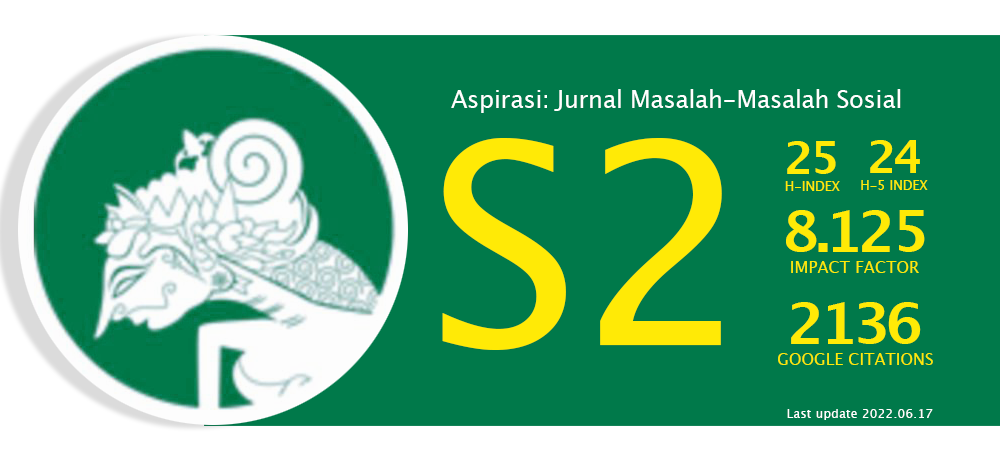Partisipasi Masyarakat dan Produsen dalam Pengelolaan Sampah Saset di Kota Depok, Jawa Barat
Abstract
Plastic is widely used as packaging, thereby increasing plastic production. One form is the use of sachets or multilayer plastic, which are widely used for food packaging and household needs. Packaging using sachets is widely used in Indonesia because the price is more economical. However, the community has not been effective in sorting their household waste, so that a lot of unmanaged plastic waste is wasted and accumulates in landfills. Law Number 18 of 2008 states that every producer is responsible for the waste they produce. However, there are only a few producers who process and recycle their sachet waste, so that scavengers and waste banks also do not accept sachet waste. This has an impact on the environment, where sachet waste is difficult to decompose. The purpose of this research is to analyze community and producer participation in waste management through the implementation of extended producer responsibility (EPR), thereby increasing the plastic circular economy. The location of this research was conducted in Depok City, which disposes of its waste to the Cipayung Landfill, Depok. Cipayung Landfill has exceeded its capacity. This research uses quantitative methods, through observation, questionnaires, and literature studies. Based on this study, it was concluded that the composition of 17 percent sachet waste can be managed with the 3R program (reduce, reuse, and recycle), which is supported by community participation in waste segregation and waste banks in the collection, where waste banks can reduce 20 percent inorganic waste, and are supported by manufacturers with the implementation of EPR.
Abstrak
Di Indonesia, banyak produsen memilih menggunakan saset plastik karena harganya yang lebih ekonomis dibandingkan bahan kemasan lainnya. Namun, penggunaan saset plastik menimbulkan masalah pengelolaan sampah. Meskipun Undang-Undang Nomor 18 Tahun 2008 tentang Pengelolaan Sampah menyatakan bahwa setiap produsen bertanggung jawab atas sampah yang dihasilkannya, masih sedikit produsen yang mengelola dan mendaur ulang sampah sasetnya. Hal ini menyebabkan pemulung dan bank sampah juga tidak menerima sampah saset. Sebagai akibatnya, sampah plastik yang tidak terkelola menumpuk di tempat pembuangan akhir (TPA) dan memperburuk masalah lingkungan. Penelitian ini bertujuan untuk menganalisis partisipasi masyarakat dan produsen dalam pengelolaan sampah saset melalui penerapan extended producer responsibility (EPR), sehingga meningkatkan ekonomi sirkular plastik. Lokasi penelitian ini dilakukan di Kota Depok, yang membuang sampahnya ke TPA Cipayung, Depok. TPA Cipayung ini sudah melebihi daya tampungnya. Penelitian ini menggunakan metode kuantitatif, dengan teknik observasi, kuesioner, dan studi literatur untuk memperoleh data. Dapat disimpulkan bahwa komposisi sampah saset sebesar 17 persen dapat dikelola dengan program 3R (reduce, reuse, dan recycle) , yang didukung oleh partisipasi masyarakat dalam pemilahan sampah dan bank sampah dalam pengumpulannya. Bank sampah dapat mengurangi 20 persen sampah anorganik dengan cara ini, yang didukung oleh produsen dengan penerapan EPR.
Keywords
Full Text:
PDFReferences
Adicita, Y., & Afifah, A. S. (2022). Analisis sistem pemilihan dan daur ulang sampah rumah tangga di daerah perkotaan menggunakan pendekatan life cycle assessment (LCA). Jurnal Ilmu Lingkungan, 20(2), 406–413. https://doi.org/10.14710/jil.20.2.406-413
Andina, E. (2019). Analisis perilaku pemilahan sampah di Kota Surabaya. Aspirasi: Jurnal Masalah-Masalah Sosial, 10(2), 119–138. https://doi.org/10.46807/aspirasi.v10i2.1424
Badan Pusat Statistik. (2018). Laporan indeks ketidakpedulian lingkungan hidup Indonesia. Badan Pusat Statistik.
Badan Standarisasi Nasional. (2019). SNI 19-3964-1994 Metode pengambilan dan pengukuran contoh timbulan dan komposisi sampah perkotaan.
Bahfein, S. (2022, Januari 31). Smart Drop Box, Inovasi Digital Unilever Kumpulkan Sampah Plastik. Kompas.com. https://www.kompas.com/properti/read/2022/01/31/163000121/smart-drop-box-inovasi-digital-unilever-kumpulkan-sampah-plastik
berita.depok.go.id. (2023, Januari 17). Pemkot Depok pelajari pengolahan sampah tanpa polusi. Berita Depok. Retrieved Mei 12, 2023, from https://berita.depok.go.id/pemkot-depok-pelajari-pengolahan-sampah-tanpa-polusi
Cai, Y.-J., & Choi, T.-M. (2021). Extended producer responsibility: A systematic review and innovative proposals for improving sustainability. IEEE Transactions on Engineering Management, 68(1), 272–288. https://doi.org/10.1109/TEM.2019.2914341
Candra, R. M., & Sucita, D. (2015). Sistem pakar penentuan jenis plastik berdasarkan sifat plastik terhadap makanan yang akan dikemas menggunakan metode certainty factor (studi kasus : cv. Minapack Pekanbaru). Jurnal CoreIT, 1(2), 77–84. https://ejournal.uin-suska.ac.id/index.php/coreit/article/view/1234/1113
Dinata, S. (2021, September 27). Plastic smart city, cara Pemkot Depok atasi sampah plastik. Republika. https://tv.republika.co.id/berita//r03qng467/plastic-smart-city-cara-pemkot-depok-atasi-sampah-plastik?
Direktorat Industri Elektronika & Telematika Direktorat Jenderal Industri Logam, Mesin, Alat Transportasi dan Elektronika Kementerian Perindustrian. (2021, Oktober 14). Extended Producer Responsibility (EPR) dalam mendukung pengelolaan sampah elektronik [Paparan]. sipsn.menlhk.go.id. https://sipsn.menlhk.go.id/download/ewaste2021/Kemenperin_Bahan_E-Waste_14Okt2021.pdf
Fachri. (2022, Oktober 6). Kolaborasi multipihak, IPRO dorong ekonomi sirkular dengan kelola sampah kemasan. Liputan6.com. https://www.liputan6.com/news/read/5090022/kolaborasi-multipihak-ipro-dorong-ekonomi-sirkular-dengan-kelola-sampah-kemasan
Heshmati, A. (2017). A review of the circular economy and its implementation. International Journal of Green Economics, 11(3–4), 251–288. https://doi.org/10.1504/ijge.2017.10010876
Horodytska, O., Valdés, F. J., & Fullana, A. (2018). Plastic flexible films waste management – A state of art review. Waste Management, 77, 413–425. https://doi.org/10.1016/j.wasman.2018.04.023
Hutahuruk, T. R. (2019). Manajemen inovasi sebagai solusi Kebijakan Terhadap Persoalan Sampah plastik di Kota Samarinda. Jurnal Riset Inossa, 1(1), 1–12. https://doi.org/10.54902/jri.v1i1.3
Irawan, G. A. S., & Chaerul, M. (2011). Konsep sistem pengumpulan sampah pengemas plastik oleh produsen sebagai bentuk penerapan extended producer responsibility (EPR). Jurnal Teknik Lingkungan, 17(2). https://doi.org/10.5614/jtl.2011.17.2.3
Istibsaroh, N. (2018, Juli 20). Kelola sampah, Indofood gandeng warung makan Indomie. ANTARA Jateng. https://jateng.antaranews.com/berita/197378/kelola-sampah-indofood-gandeng-warung-makan-indomie
Jambeck, J. R., Geyer, R., Wilcox, C., Siegler, T. R., Perryman, M., Andrady, A., Narayan, R., & Law, K. L. (2015). Plastic waste inputs from land into the ocean. Science, 347(6223), 768–771. https://doi.org/10.1126/science.1260352
Johannes, H. P., Kojima, M., Iwasaki, F., & Edita, E. P. (2021). Applying the extended producer responsibility towards plastic waste in Asian developing countries for reducing marine plastic debris. Waste Management and Research, 39(5), 690–702. https://doi.org/10.1177/0734242X211013
Kamsiati, E., & Herawati, H. (2017). Potensi pengembangan plastik biodegradable berbasis pati sagu dan ubikayu di Indonesia. Jurnal Penelitian dan Pengembangan Pertanian, 36(2), 67–76.
Kemasan sachet: Pengertian dan contoh aplikasi produknya. (2022, Januari 7). FlexyPack. Retrieved Mei 11, 2023, from https://flexypack.com/news/kemasan-sachet-pengertian
Nurcahyani, N. (2022, Juni 14). Tim Ekspedisi Sungai temukan banyak sampah plastik di bantaran Ciliwung. Tempo. https://metro.tempo.co/amp/1601557/tim-ekspedisi-sungai-temukan-banyak-sampah-plastik-di-bantaran-ciliwung
Nursaniyah, F. (2020, Februari 25). Mulai 1 Maret aturan belanja tanpa kantong plastik di Depok Resmi Berlaku, Pengusaha retail gencar lakukan sosialisasi. Depok Pikiran Rakyat. https://depok.pikiran-rakyat.com/lokal-depok/pr-09343756/mulai-1-maret-aturan-belanja-tanpa-kantong-plastik-di-depok-resmi-berlaku-pengusaha-retail-gencar-lakukan-sosialisasi
Paramita, D., Murtilaksono, K., & Manuwoto. (2018). Kajian pengelolaan sampah berdasarkan daya dukung dan kapasitas tampung prasarana persampahan Kota Depok. Journal of Regional and Rural Development Planning, 2(2), 104–117. https://doi.org/10.29244/jp2wd.2018.2.2.104-117
pemburukuis.com. (2022, Maret 1). Undian Kopi Luwak berhadiah umroh dan perhiasan emas. Pemburukuis.com. Retrieved Juni 2, 2023, from https://www.pemburukuis.com/undian-kopi-luwak-berhadiah-20-umroh-50-gelang-100-cincin-dan-25-kalung/
Peraturan Daerah Kota Depok Nomor 13 Tahun 2018 tentang Perubahan atas Peraturan Daerah Kota Depok Nomor 05 Tahun 2014 tentang Pengelolaan Sampah. (2018).
Peraturan Daerah Kota Depok Nomor 21 Tahun 2017 tentang Perubahan Atas Peraturan Daerah Kota Depok Nomor 7 Tahun 2016 tentang Rencana Pembangunan Jangka Menengah Daerah Kota Depok Tahun 2016–2021. (2017).
Peraturan Menteri Lingkungan Hidup dan Kehutanan Nomor P.75 Tahun 2019 tentang Peta Jalan Pengurangan Sampah oleh Produsen. (2019).
Peraturan Menteri Perindustrian Nomor 24 Tahun 2010 tentang Pencantuman Logo Tara Pangan dan Kode Daur Ulang pada Kemasan Pangan dari Plastik. (2010).
Peraturan Pemerintah Nomor 81 Tahun 2012 tentang Pengelolaan Sampah Rumah Tangga dan Sampah Sejenis Rumah Tangga. (2012).
Peraturan Presiden Nomor 97 Tahun 2017 tentang Kebijakan dan Strategi Nasional Pengelolaan Sampah Rumah Tangga dan Sampah Sejenis Sampah Rumah Tangga. (2017).
Peraturan Walikota Depok Nomor 15 Tahun 2019 tentang Pengurangan Penggunaan Kantong Belanja Plastik dan Wadah/Kemasan Makanan dan Minuman. (2019).
Prahara, L. (n.d.). Extended producer responsibility. https://www.academia.edu/39956618/Penerapan_EPR_di_Indonesia_Review
Ramadhan, I. (2021, Januari 14). “Bank sampah” jadi solusi terbaik atasi sampah di Kota Depok. Siaran Depok. https://www.siarandepok.com/baca/20210114/bank-sampah-jadi-solusi-terbaik-atasi-sampah-di-kota-depok.html
Riyandi, S. (2018, Mei 3). Kemenperin: Produksi plastik nasional capai 4,6 juta ton. JawaPos.com. https://www.jawapos.com/bisnis/0144871/kemenperin-produksi-plastik-nasional-capai-46-juta-ton
Rofai, A. (2019, April 10). Jual beli tanpa plastik, mungkinkah?. Greenpeace. Retrieved May 12, 2023, from https://www.greenpeace.org/indonesia/cerita/2658/jual-beli-tanpa-plastik-mungkinkah/
Samadikun, B. P. (2018). Pengaruh pendampingan masyarakat dalam pemilahan sampah di Desa Pucung Kecamatan Tirto Kabupaten Pekalongan. Jurnal Presipitasi: Media Komunikasi dan Pengembangan Teknik Lingkungan, 15(1), 46–52. https://doi.org/10.14710/presipitasi.v15i1.46-52
Schwarz, A. E., Ligthart, T. N., Godoi Bizarro, D., De Wild, P., Vreugdenhil, B., & van Harmelen, T. (2021). Plastic recycling in a circular economy; determining environmental performance through an LCA matrix model approach. Waste Management, 121, 331-342. https://doi.org/10.1016/j.wasman.2020.12.020
Sistem Informasi Pengelolaan Sampah Nasional. (2020b). Komposisi sampah. SIPSN - Sistem Informasi Pengelolaan Sampah Nasional. Retrieved Mei 12, 2023, from https://sipsn.menlhk.go.id/sipsn/public/data/komposisi
Sistem Informasi Pengelolaan Sampah Nasional. (2020a). Timbulan sampah. SIPSN - Sistem Informasi Pengelolaan Sampah Nasional. Retrieved Mei 12, 2023, from https://sipsn.menlhk.go.id/sipsn/public/data/timbulan
Suryani, A. S. (2014). Peran bank sampah dalam efektivitas pengelolaan sampah (studi kasus bank sampah Malang). Aspirasi: Jurnal Masalah-Masalah Sosial, 5(1), 71–84. https://jurnal.dpr.go.id/index.php/aspirasi/%0Aarticle/view/447%0A
Tristiana, E., Koeswahyono, I., & Fadli, M. (2018, July). Managing policy of extended producer responsibility (EPR) implementation to reduce plastic waste in Indonesia. International Journal of Humanities and Social Science Invention, 7(07), 25–32. http://www.ijhssi.org/papers/vol7(7)/Version-2/E0707022532.pdf
Unilever perkenalkan CreaSolv® Process untuk daur ulang sampah kemasan sachet. (2017, May 17). Unilever Indonesia. Retrieved May 12, 2023, from https://www.unilever.co.id/news/press-releases/2017/creasolv-process/
United Nations Development Programme. (2019, June 26). Plastics and the circular economy: Community solutions. United Nations Development Programme. Retrieved June 2, 2023, from https://www.undp.org/content/undp/en/home/librarypage/environment-energy/sgp/plastics-and-circular-economy--community-solutions.html
Verawati, P. (2022). Kebijakan extended producer responsibility dalam penanganan masalah sampah di Indonesia. Jurnal Justicia, 9(1), 189–197. http://dx.doi.org/10.31604/justitia.v9i1.189-197
Wahyuni, E. T., Sunarto, & Setyono, P. (2014). Optimalisasi pengelolaan sampah melalui partisipasi masyarakat dan kajian extended producer responsibility (EPR) di Kabupaten Magetan. Jurnal EKOSAINS, VI(1), 8–23. https://pasca.uns.ac.id/s2ilmulingkungan/wp-content/uploads/sites/25/2016/09/Optimalisasi-Pengelolaan-Sampah-Melalui-Partisipasi-Masyarakat-dan-Kajian-Extended-Producer-Responsibility-EPR-di-Kabupaten-Magetan.pdf
Walker, T. W., Frelka, N., Shen, Z., Chew, A. K., Banick, J., Grey, S., Kim, M. S., Dumesic, J. A., Van Lehn, R. C., & Huber, G. W. (2020). Recycling of multilayer plastic packaging materials by solvent-targeted recovery and precipitation. Science Advances, 6(47), 1–10. https://doi.org/10.1126/sciadv.aba7599
Wright, S. L., & Kelly, F. J. (2017). Plastic and human health: A micro issue? Environ. Sci. Technol, 51(12), 6634–6647. https://doi.org/10.1021/acs.est.7b00423
Yandwiputra, A. R. (2022, Mei 27). WWF Indonesia turun tangan bantu penanganan sampah Depok. Metro Tempo.co. https://metro.tempo.co/read/1595811/wwf-indonesia-turun-tangan-bantu-penanganan-sampah-depok
DOI: https://doi.org/10.46807/aspirasi.v14i1.3419
Refbacks
- There are currently no refbacks.








